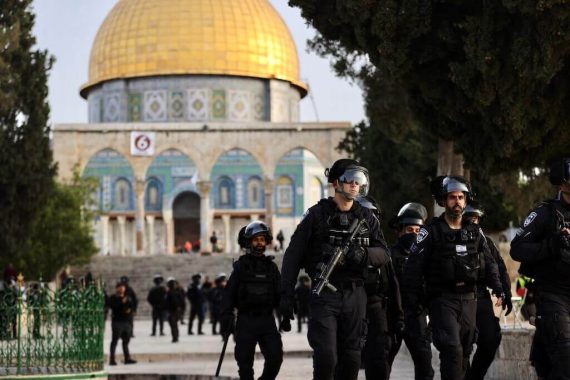In response to the recent events at al-Aqsa Mosque, nearly every Middle Eastern and North African government has condemned the Israeli occupiers’ brutality against the Palestinians. Despite the United Arab Emirates (UAE), Bahrain, Morocco, and Sudan normalizing relations with Tel Aviv in 2020, these four Arab states joined the region by denouncing Israel for its violent actions such as storming Al-Aqsa on multiple occasions amid the holy month of Ramadan.
In response, the UAE’s minister of state for international cooperation Reem bint Ibrahim Al-Hashemy summoned the Israeli ambassador to Abu Dhabi, Amir Hayek, on April 19 to express the Emirati leadership’s disapproval of Israel’s actions in Jerusalem and the West Bank. According to the UAE’s state-run WAM, “Al-Hashemy stressed the need to immediately stop these events, provide full protection for worshipers, respect the right of Palestinians to practice their religious rites, and halt any practices that violate the sanctity of Al Aqsa Mosque.”
Against the backdrop of increased violence against Palestinians, the Emiratis canceled Etihad Airways and Wizz Air Abu Dhabi’s participation in an Israeli air show, scheduled for May 5 to mark the 74th anniversary of Israel’s establishment in 1948. The UAE’s foreign ministry cited violence in Jerusalem, stressing “the need to immediately stop these events, provide full protection for worshipers, respect the right of Palestinians to practice their religious rites, and halt any practices that violate the sanctity of al-Aqsa Mosque.”
To be sure, one must not interpret these two actions as the UAE signaling an end to its honeymoon with Israel. Rather, euphoria over the deal is still prominent as UAE-Israel relations evolve, and as the states learn more about the other’s sticking points. Indeed, both Abu Dhabi and Tel Aviv remain highly optimistic about normalization and opportunities stemming from it, especially as both states have deep economic and security interests in the partnership growing further.
But Abu Dhabi faces domestic and regional pressure to take mild actions in response to the increased violence against Palestinians. Although symbolic, these signals to Arabs and Muslims in the Emirates and across the region highlight how the UAE’s leadership will not remain silent in the face of Israeli brutality.
However, while Abu Dhabi summoning Israeli’s ambassador marks the biggest public rebuke of Israel since the signing of the Abraham Accords in 2020, the UAE could have taken much more serious action, particularly given the scope of Emirati-Israeli relations and Abu Dhabi’s supposed support for Palestinians through the Abraham Accords—a key justification for signing the deal in the first place.
“If that’s all they can do, it shows not only their impotence in the face of Israeli behavior but also that they frankly don’t give a damn,” explained Nabeel Khoury, a former U.S. diplomat and a nonresident senior fellow at the Atlantic Council’s Rafik Hariri Center for the Middle East, in an interview with Politics Today. He called it “a token gesture to say, ‘There, we’ve done something about it so don’t blame us.’”
Indeed, Emirati officials remaining silent last month could have subjected Abu Dhabi to some real risks which the UAE’s leadership wants to avoid. “The UAE, like other Arab countries, has to contend with internal (though muted) and regional (less muted and potentially dangerous) frustrations,” said Khoury. “Their rulers may not feel it, but the Arab masses still care about Palestine and feel great humiliation at what the Palestinians are suffering at the hands of the Israelis.” While Emirati leadership may not answer to such masses, it certainly recognizes the value of balancing its new relationship with Tel Aviv.
In this context, although much analysis on Emirati-Israeli relations post-2020 has heavily focused on how the UAE government views the Jewish state, there is little discussion about public opinion in the Emirates. This suits officials in Abu Dhabi who hope to downplay any significant public opinion vis-à-vis Palestine, which could undermine the Abraham Accords.
“Knowing the Emirates well, having spent years visiting there and developing friendships with very high-ranking officials, academics, opinion makers, and businessmen—I don’t think that the majority of Emiratis are really comfortable with the speed and with the direction of normalization,” Khalil Jahshan, executive director of the Arab Center Washington DC, told Politics Today. “They might not have issue with the concept, that it is for them convincingly in the interests of the Emirates as a country, but there is a limit.”
It is important to realize that under the leadership of Sheikh Zayed bin Sultan Al Nahyan, who ruled the UAE for more than three decades and is hailed as the country’s founder, Abu Dhabi had a significantly different attitude toward the Palestinian issue.
“The Emirates was leading the Arab world in adherence to unwavering support for Palestine as a matter of principle,” Jahshan pointed out. “I heard Sheikh Zayed in person on several occasions state that normal relations [with Israel], fine, but not before solving the Palestine problem. So now the Emirates definitely has changed and taken a different stand. But that doesn’t mean that the public has shifted gears on this issue.”
Regional factors, particularly concerning Jordan, also play a role. Amman seems to be the Arab capital most active in soliciting pan-Arab support for standing against the recent Israeli violence against Palestinians in the occupied territories, partly underscored by its apparent refusal to attend the recent Negev Summit.
Jordanian King Abdullah II likely intended to signal to the Abraham Accord members his frustration that minimal focus has been placed on Palestine by holding a parallel meeting with Palestinian Authority President Mahmoud Abbas on the same day. These actions are easy to understand considering the Hashemite Kingdom’s custodianship over Jerusalem’s holy places and substantial Palestinian population.
Maintaining a deep relationship with the UAE, Jordan appealed to Abu Dhabi for support this month in relation to the Palestinian issue. A subsequent April 24 meeting in Cairo between the heads of the UAE, Jordan, and Egypt to discuss tensions in Jerusalem, jointly calling on Israel to “respect the status quo of Al Aqsa mosque.” Therefore, the UAE’s decision to denounce Israel was not only about standing up for Palestinians, but also accounting for Jordanian interests.
Recommended
Also important are the considerations of other Arab members of the Abraham Accord members: Bahrain, Moroccan and Sudan. These countries and the UAE coordinated their condemnations of Israel’s aggression, releasing statements within hours of each other on April 16. Strategically, it is wise for these states to present a united front hedging against the unknowns of how Israel may respond to criticism amid a normalization honeymoon.
Ultimately, the UAE is attempting to strike a balance whereby they continue to build on the Abraham Accords and grow bilateral relations with Israel while also officially opposing the occupation of Palestinian lands annexed in 1967. Abu Dhabi is nowhere near walking away from its normalized relationship with Israel as it believes there is much to gain from this partnership, not limited to defense, tourism, investment, and technology gains. Such interests take precedence over Palestinian issues, exemplified by the lackluster support for Palestine in recent years.
Yet the Emiratis understand the Palestinian issue is not resolved nor irrelevant, and simply trying to bury it is extremely difficult. If recent events at al-Aqsa further regionalize and lead to growing anger at Israel from Arab populations, it will be increasingly challenging for the UAE to maintain such a balance.






